
Roberta Joan "Joni" Mitchell is a Canadian-American singer-songwriter, multi-instrumentalist, and painter. As one of the most influential singer-songwriters to emerge from the 1960s folk music circuit, Mitchell became known for her personal lyrics and unconventional compositions which grew to incorporate pop and jazz elements. She has received many accolades, including eleven Grammy Awards and induction into the Rock and Roll Hall of Fame in 1997. Rolling Stone called her "one of the greatest songwriters ever", and AllMusic has stated, "Joni Mitchell may stand as the most important and influential female recording artist of the late 20th century."

Stephen Arthur Stills is an American musician, singer, and songwriter best known for his work with Buffalo Springfield, Crosby, Stills & Nash, and Manassas. As both a solo act and member of three successful bands, Stills has combined record sales of over 35 million albums. He was ranked number 28 in Rolling Stone's 2003 list of "The 100 Greatest Guitarists of All Time" and number 47 in the 2011 list. Stills became the first person to be inducted twice on the same night into the Rock and Roll Hall of Fame. According to Neil Young, "Stephen is a genius".

Ladies of the Canyon is the third studio album by the Canadian singer-songwriter Joni Mitchell, released on Reprise Records in 1970. It peaked at No. 27 on the Billboard 200, and has been certified platinum by the RIAA. The title makes reference to Laurel Canyon, a center of popular music culture in Los Angeles during the 1960s, where Mitchell lived while she was writing the album. Specifically, Mitchell lived and wrote at 8217 Lookout Mountain Avenue, the house which is the subject of Graham Nash's "Our House". The album includes several of Mitchell's most noted songs, such as "Big Yellow Taxi", "Woodstock" and "The Circle Game".
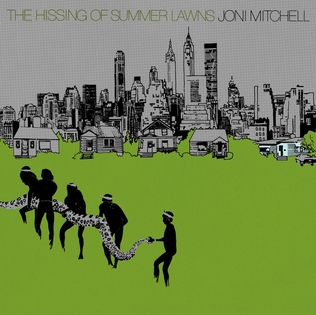
The Hissing of Summer Lawns is the seventh studio album by the Canadian-American singer-songwriter Joni Mitchell, released in November 1975 on Asylum Records. It continues the jazz-influenced sound of Mitchell's previous album, Court and Spark, with more unconventional and experimental material. It features sampling, synthesizers such as the Moog and ARP, and contributions from acts including the jazz-rock groups the L.A. Express and the Jazz Crusaders and James Taylor, David Crosby, and Graham Nash.
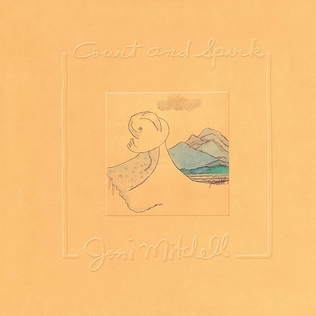
Court and Spark is the sixth studio album by Canadian singer-songwriter Joni Mitchell. Released in January 1974, it infuses the folk rock style of her previous albums with jazz elements.

Neil Young is the debut studio album by Canadian/American musician Neil Young following his departure from Buffalo Springfield in 1968, issued on Reprise Records, catalogue number RS 6317. The album was first released on November 12, 1968, in the so-called 'CSG mix'. It was then partially remixed and re-released in late summer 1969, but at no time has the album ever charted on the Billboard 200.
"A Case of You" is a song by Joni Mitchell, from her 1971 album Blue.

Both Sides Now is a concept album and studio album by Canadian singer-songwriter Joni Mitchell that was released in 2000. It is her 17th studio album. The album won two Grammy Awards in 2001 for Best Traditional Pop Vocal Album and Best Instrumental Arrangement Accompanying Vocalist(s) for the song "Both Sides Now" and a Juno Award for Vocal Jazz Album of the Year.
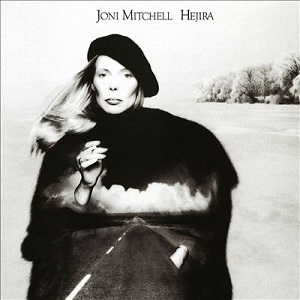
Hejira is the eighth studio album by Canadian singer-songwriter Joni Mitchell, released in 1976 on Asylum Records. Its material was written during a period of frequent travel in late 1975 and early 1976, and reflects Mitchell's experiences on the road during that time. It is characterized by lyrically dense, sprawling songs and musical backing by several jazz-oriented instrumentalists, most prominently fretless bass player Jaco Pastorius, guitarist Larry Carlton, and drummer John Guerin.
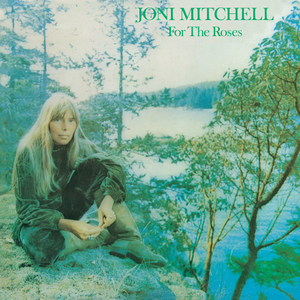
For the Roses is the fifth studio album by the Canadian singer-songwriter Joni Mitchell. It was released in November 1972, between her two biggest commercial and critical successes—Blue and Court and Spark. In 2007 it was one of 25 recordings chosen that year by the Library of Congress to be added to the National Recording Registry.
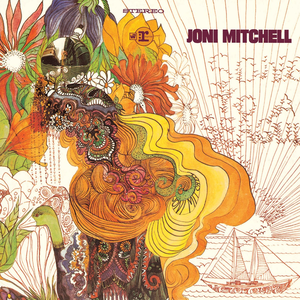
Song to a Seagull is the debut studio album by the Canadian singer-songwriter Joni Mitchell. Produced by David Crosby, the album was recorded in early 1968 at Sunset Sound and released in March 1968 by Reprise Records.
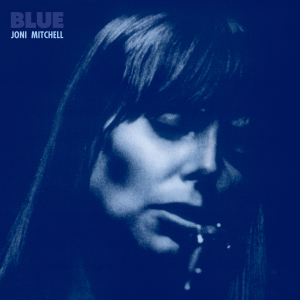
Blue is the fourth studio album by the Canadian singer-songwriter Joni Mitchell, released on June 22, 1971, by Reprise Records. Written and produced entirely by Mitchell, it was recorded in 1971 at A&M Studios in Hollywood, California. Created just after her breakup with Graham Nash and during an intense relationship with James Taylor, Blue explores various facets of relationships from love on "A Case of You" to insecurity on "This Flight Tonight". The songs feature simple accompaniments on piano, guitar and Appalachian dulcimer. The album peaked at number 3 on the UK Albums Chart, number 9 on the Canadian RPM Albums Chart and number 15 on the Billboard 200.

Turbulent Indigo is the 15th album by Canadian singer-songwriter Joni Mitchell. Released in 1994, it won a Grammy Award for Best Pop Album. John Milward, writing for Rolling Stone, wrote that it was Mitchell's "best album since the mid-'70s".

Hendrix in the West is a live album by Jimi Hendrix, released posthumously in January 1972 by Polydor Records (UK), and in February by Reprise Records (US). The album tracks are split between those recorded in 1969 by the Jimi Hendrix Experience with bassist Noel Redding and drummer Mitch Mitchell and in 1970 with Billy Cox and Mitchell during The Cry of Love Tour.
"Both Sides, Now" is a song by Canadian singer-songwriter Joni Mitchell. One of the first recordings is by Judy Collins, whose version appeared on the US singles chart during the fall of 1968. The next year it was included on Mitchell's album Clouds, and became one of her best-known songs. It has since been recorded by dozens of artists, including Dion in 1968, Clannad with Paul Young in 1991, and Mitchell herself, who re-recorded the song with an orchestral arrangement on her 2000 album Both Sides Now.

Who Knows Where the Time Goes is the seventh studio album by American singer and songwriter Judy Collins, released by Elektra Records in 1968. It peaked at No. 29 on the Billboard 200 charts.
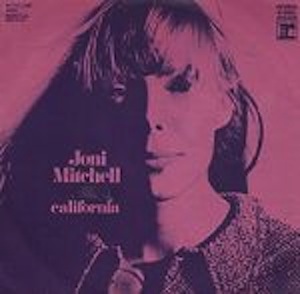
"California" is a song written by Joni Mitchell that first appeared on her 1971 album Blue. It was also released as the second single from the album, as a follow-up to "Carey".

The Joni Mitchell Archives is an ongoing project to release previously unreleased recorded material by Canadian singer-songwriter Joni Mitchell. So far, each new release schedule consists of a box set collection, a compilation with material on the box set release, and a live album. The project is being overseen by Mitchell and Patrick Milligan, director of A&R for Rhino Records, the label through which the project's offerings are being released. The first release also received input from Neil Young, who had experience with the release of his own extensive archival series, and Mitchell and Young's late manager Elliot Roberts, who died during the process of planning the first box set, and to whom the release is dedicated.

The Reprise Albums (1968–1971) is a four-disc box set by Canadian singer-songwriter Joni Mitchell, that was released on June 25, 2021, by Rhino Records. The set is the sixth overall release and first box set of remastered albums from the Joni Mitchell Archives, a planned series of releases featuring remastered and unreleased material from the singer's archives. Formatted in chronological order, the first volume of the remaster series includes Mitchell's first four albums, all of which were released on Reprise Records: Song to a Seagull (1968), Clouds (1969), Ladies of the Canyon (1970), and Blue (1971).

Joni Mitchell Archives – Vol. 2: The Reprise Years (1968–1971) is a five-disc box set by Canadian singer-songwriter Joni Mitchell, released on November 12, 2021, by Rhino Records. The box set is the seventh overall release and second offering of unreleased material from the Joni Mitchell Archives, a planned series of releases containing remastered material from the singer's personal archives. Formatted in chronological order, the second volume of the series consists of the archived material that was recorded during Mitchell's tenure at Reprise Records, which includes the years between the release of her debut studio album, Song to a Seagull (1968) and her fourth studio album, Blue (1971).


















